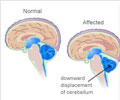Q: Which doctor should I consult for Cavernous Malformation?
A: The doctor you should consult for a cavernous malformation would depend on the location of the malformation. For a malformation in the brain, you would need to visit a neurologist or neurosurgeon. For a malformation in the eye, you would need to visit a neuro-ophthalmologist and for malformations in the liver, you should visit a hepatologist.
Q: What are the tests for Cavernous Malformation?
A: Computerized Axial Tomography (CAT scan) and the Magnetic Resonance Imaging (MRI), can detect cerebral cavernous malformation, while an ultrasound test or a Single-photon emission computerized tomography scan can diagnose a liver malformation. Magnetic resonance imaging (MRI) scan and the magnetic resonance angiography (MRA) can be used to detect orbital cavernous malformation of the eye.
Q: Is there any prenatal testing for familial cavernous malformation?
A: Yes. A genetic counselor will help determine if any genes are responsible for your cavernous malformations by taking a blood test. The counselor may also guide you regarding pregnancy decisions. Each of your children will have a 50% chance of inheriting the disease if the disease runs in your family.
Q: Can I have a normal pregnancy if I have a cavernous malformation?
A: If you have a familial cavernous malformation, it is better to undergo genetic counseling to check for its type and severity. An MRI test and surgery may be advised before getting pregnant. If you develop seizures during pregnancy, you may need anti-seizure medications, which will be prescribed by your obstetrician.
Q: When can I check my baby for cavernous malformation if it runs in my family?
A: Children should be screened before school age for the illness if it runs in the family. A CT or MRI scan can be performed to detect cavernous malformation.








